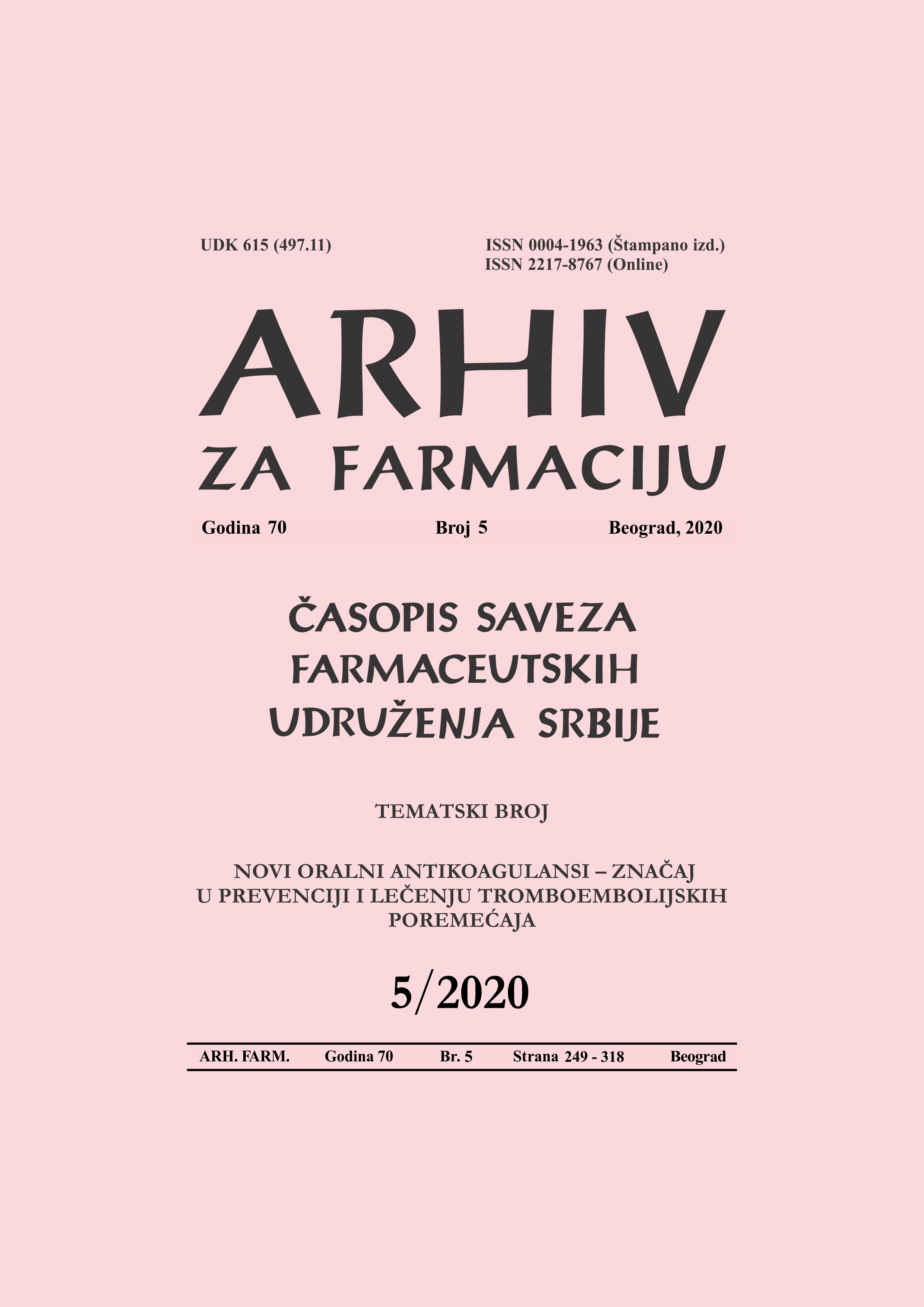The preoperative management of dabigatran and its specific antidote idarucizumab in patients with nonvalvular atrial fibrillation – case reports
Abstract
Dabigatran is a novel oral anticoagulant preferred due to its ease of use, favorable pharmacokinetics, decreased potential for drug–drug interactions, and the lack of monitoring requirements. With the growing use of dabigatran, it is important to highlight that dabigatran increases the risk of hemorrhage after some procedures. Therefore, when dabigatran is used before the elective or urgent procedures, it is necessary to compare the thromboembolic event risk with the relative risk of bleeding. Before the approval of a reversal agent, the lack of specific antidotes had been the major limitation against the widespread utilization of dabigatran. In October 2015, idarucizumab, a humanized monoclonal antigen-binding antibody fragment capable of reversing the anticoagulant activity of dabigatran, has been introduced into the market to be used in life-threatening bleeding or urgent surgery. In this manuscript, the preoperative management of dabigatran and the initial experience of using idarucizumab in a patient with nonvalvular atrial fibrillation were described. We propose that the option of dabigatran reversal needs to be considered in patients with nonvalvular atrial fibrillation. However, additional research is needed to define optimal perioperative management of dabigatran and other novel oral anticoagulants, especially in high bleeding risk patients, and to determine whether pre-procedure coagulation testing should be performed.
References
Sikorska J, and Uprichard J. Direct oral anticoagulants: A quick guide. Eur Cardiol. 2017;12(1):40–5.
Huisman MV, Klok FA. Pharmacological properties of betrixaban. Eur Heart J Suppl. 2018;20(Suppl E):E12–E15.
Praxbind (idarucizumab) injection for intravenous use prescribing information. Ridgefield, Connecticut: Boehringer Ingelheim Pharmaceuticals, Inc.;October 2015. https://www.accessdata.fda.gov/drugsatfda_docs/label/2015/761025lbl.pdf (last accessed: 23/10/2020)
Leung TS, Fradette M, Thompson A, et al. Dabigatran in atrial fibrillation: New kid on the block. Can Pharm J (Ott). 2012;145(2):83–7.e1.
Connolly SJ, Ezekowitz MD, Yusuf S, et al. Dabigatran versus warfarin in patients with atrial fibrillation. N Engl J Med. 2009;361(12):1139–51.
Eby C. Novel anticoagulants and laboratory testing. Int J Lab Hematol 2013;35:262-8.
Eerenberg ES, Kamphuisen PW, Sijpkens MK, et al. Reversal of rivaroxaban and dabigatran by prothrombin complex concentrate: a randomized, placebo-controlled, crossover study in healthy subjects. Circulation. 2011;124(14):1573–9.
Pollack CV, Reilly PA, Eikelboom J, et al. Idarucizumab for dabigatran reversal. N Engl J Med. 2015;373(6):511–20.
Pollack CV, Reilly PA, van Ryn J, et al. Idarucizumab for dabigatran reversal-full cohort analysis. N Engl J Med. 2017;377(5):431–41.
Glund S, Stangier J, Schmohl M, et al. Safety, tolerability, and efficacy of idarucizumab for the reversal of the anticoagulant effect of dabigatran in healthy male volunteers: a randomised, placebo-controlled, double-blind phase 1 trial. Lancet. 2015;386(9994):680-90.
Glund S, Moschetti V, Norris S, et al. A randomised study in healthy volunteers to investigate the safety, tolerability and pharmacokinetics of idarucizumab, a specific antidote to dabigatran. Thromb Haemost. 2015;113(05):943-51.
Reilly P, van Ryn J, Grottke O, et al. Idarucizumab, a specific reversal agent for dabigatran: mode of action, pharmacokinetics and pharmacodynamics, and safety and efficacy in phase 1 subjects. Am J Med. 2016;129(Suppl 11):S64-S72.
Husted S, Verheugt FW, Comuth WJ. Reversal strategies for NOACs: state of development, possible clinical applications and future perspectives. Drug Saf. 2016;39:5–13.
ASGE Standards of Practice Committee; Acosta RD, Abraham NS, Chandrasekhara V, et al. The management of antithrombotic agents for patients undergoing GI endoscopy Gastrointest Endosc. 2016;83(1):3-16.
Douketis JD, Wang G, Chan N, et al. Effect of standardized perioperative dabigatran interruption on the residual anticoagulation effect at the time of surgery or procedure. J Thromb Haemost. 2016;14(1):89-97.
Garcia D, Barrett YC, Ramacciotti E, et al. Laboratory assessment of the anticoagulant effects of the next generation of oral anticoagulants. J Thromb Haemost. 2013.11(2):245-52.
Cuker A, Deborah M, Siegal DM , et al. Laboratory measurement of the anticoagulant activity of the target-specific oral anticoagulant agents: a systematic review. J Am Coll Cardiol. 2014;64(11):1128–1139.
Ten Cate H, Henskens Y, Lancé MD. Practical guidance on the use of laboratory testing in the management of bleeding in patients receiving direct oral anticoagulants. Vasc Health Risk Manag. 2017;13:457–67.

